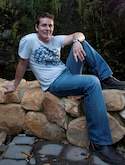While most of his winemaking peers trained locally and went overseas for work stints, Gottfried Mocke did things the other way around. But unorthodox career paths seem to run in the family.
Vintage 10

Gottfried grew up in the small Boland town of Swellendam along the Garden Route. It was where his father had founded his own private school for boys.
His life then still an open book, Gottfried spent a school holiday with family friend and winemaker Kurt Amman at Rozendal in Stellenbosch. While there, he was sent over to nearby Rustenberg for a day to help fill barrels with chardonnay: 'A lot landed up on the floor!' he recalls.
Still not entirely convinced that winemaking was a career option, he decided to take a gap year in 1995. He worked the harvest at Toitskloof winery in the Breede River Valley, enjoyed the practical experience, and decided to fit in another harvest by heading to the northern hemisphere.
'The German system is very practical, which appealed to me. It's based on apprenticeships and mentoring,' he explains. One year became five. He worked for top riesling producer August Kessler ('whose winemaker Velten Tiemann was a close family friend'), Weingut Wendel in the Pfalz and the Johanninger winery in Bad Kreuznach in the Nahe, and studied at the famous Weinsberg Institute.
'It’s hard work: the vineyards on the Rhine River are steep and you do everything, from tending vines to cellar work to wine deliveries, which includes climbing hts of stairs for personal apart-to-door service.'
It was being mentored by the Johanninger family, a new generation of German producers making Burgundian wines, that introduced him to those two regional French classics pinot noir (his first love) and chardonnay (a close second in his affections). 'The two invariably go hand in hand.'
As part of the Weinsberg Institute's programme he travelled abroad, choosing to work in Oregon in the United States al Rex Hill Vineyards, specialists in the two Burgundian greats. 'l rate Oregon as the home of some of the New World's greatest pinots.'
Of his training in Germany, he says: 'I got a rock-solid foundation in winemaking: they're all about logic; there's a reason behind everything you do, it's not just for the hell of it or because it's always been done that way without anyone knowing exactly why.' It suited Gottfried's precise approach to everything he tackles.
 Chicken and clam tomato casserole recipe by Gottfried Mocke served with couscous and paired with Cape Chamonix Pinot Noir Reserve wine....
Chicken and clam tomato casserole recipe by Gottfried Mocke served with couscous and paired with Cape Chamonix Pinot Noir Reserve wine.... Sheep’s Pluck in sweet-and-sour sauce recipe by Gottfried Mocke served with fresh ciabatta and paired with Cape Chamonix Chardonnay Reserv...
Sheep’s Pluck in sweet-and-sour sauce recipe by Gottfried Mocke served with fresh ciabatta and paired with Cape Chamonix Chardonnay Reserv...